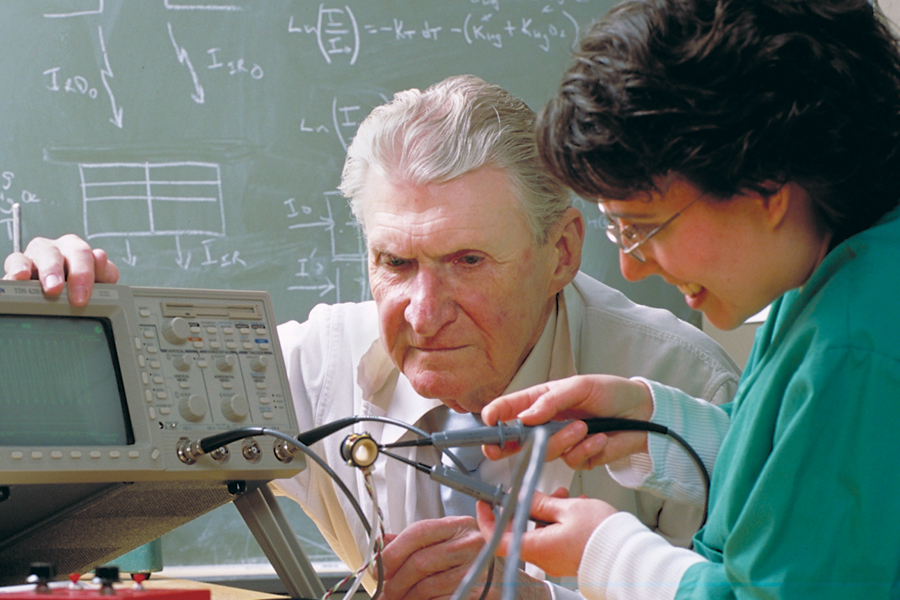John DeFord credits his mentor, Les Geddes, and the Weldon School of Biomedical Engineering
Section Investments in Infrastructure
When John DeFord entered Purdue University in the fall of 1980, his aspiration was to earn a degree in electrical engineering and get a job in the industry. But Purdue had grander plans for him.
During his second semester, DeFord (BSEE ’84, MSEE ’85, PhD ’90) broadened his horizons. “I responded to an advertisement in the Exponent seeking paid volunteers for a study of electrosurgical electrodes,” he says. “That was my introduction to biomedical engineering, Dr. Geddes and the amazing team he had assembled.”
Leslie “Les” Geddes, famous for his pioneering work in the implantable medical device field, was recruited to Purdue in 1974 to form a biomedical engineering research center. He retired in 1991 as the Showalter Distinguished Professor Emeritus of Biomedical Engineering, although he continued his research and teaching well after that. He died in 2009 at the age of 88, just two days after teaching his regularly scheduled class.
“With the notable exceptions of my father and my amazing wife, Kathy, Dr. Geddes was the most influential person in my life — and certainly the most influential in my education and career,” DeFord says. “I was fortunate to work very closely with him over the entire decade of the 1980s. He took me under his wing and mentored me in more than just academics.”

Cultivating innovation
In the spirit of DeFord’s gratitude for his mentor, his alma mater, and the field that shaped his career, he and his wife recently made a significant gift to support the new Innovation Wing of Martin C. Jischke Hall of Biomedical Engineering. Biomedical engineering research at Purdue has resulted in more than 100 U.S. patents and has helped 2 million patients worldwide with innovative medical technologies.
“We plan to name the atrium in the Innovation Wing in their honor,” says George R. Wodicka, the Dane A. Miller Head and Professor of the Weldon School of Biomedical Engineering. “It’s particularly apropos for John, who, as reflected by his integrative personality, understands the need for collaborative spaces.”
When Jischke Hall was dedicated eight years ago, no one predicted that the school would need a wing so quickly. Nevertheless, Wodicka says the building was designed with expansion in mind. “We’ve grown so fast, with unprecedented student interest, that we have already reached our facility limits on many translational activities. The new wing will expand capabilities for prototyping and testing and enable us to develop good ideas to the point where our company partners can say, ‘Let’s run with it.’”
A mentor like no other
During DeFord’s nearly 10 years at Purdue, Geddes could always sense when his student was facing challenges.
“For example,” DeFord says, “as I neared the summer between my junior and senior years, Dr. Geddes offered me a research job working 40 hours a week. I told him I would love to, but I couldn’t afford housing. He asked me what I could afford, and I flippantly told him 50 bucks. He didn’t flinch and said, ‘Give me a couple of days.’”
Sure enough, Geddes came back with news that he had found a place for $50. “I asked if it was $50 per month, and he said, ‘No, $50 for the summer.’ It was impossible to say no, and so I lived at a fraternity on the hill — watching over it and having the run of the place — all for $50.”
By the time DeFord was set to graduate with his bachelor’s degree, Geddes suggested graduate school. “He told me he had a project and funds for a research assistant. Needless to say, I stayed and completed a master’s degree in 1985.”
A year later, Geddes persuaded DeFord to return to campus to join a startup team for Med Institute Inc., a company within the Cook Medical Group. And, always encouraging DeFord to aim higher, it wasn’t long before Geddes convinced him to earn a PhD. DeFord finished his doctorate in the spring of 1990.
Aiming high, achieving higher
Returning to the Cook Medical Group, DeFord rose from project development manager to president and CEO in less than a decade. He did a stint at the Early Stage Partners venture capital firm, where he funded early-stage medical technology companies. “Again, the Purdue training and experience, including a broad range of technologies and clinical needs, gave me this amazing opportunity,” DeFord says.
In 2003, he was recruited to New Jersey-based medical device company C.R. Bard Inc., as vice president of science and technology. Over the next 14 years, DeFord grew the company more than 275 percent through the development of a significant organic R&D engine.
Currently, DeFord is executive vice president and chief technology officer of Becton, Dickinson and Co., which acquired Bard in December 2017. Leading research and development, DeFord continues to grow the product portfolio.
Ever humble, ever true
“Dr. Geddes and the biomedical engineering team is at the heart of all my opportunities,” DeFord says. “The Weldon School, with its growing impact through research and the education of academic and industry leaders, is incredibly worthy of our support.”
Banner Photo Caption
Kathy and John DeFord
Related Stories
Navigation
Fall 2018
Pinnacle of Excellence at Scale
Dean Mung Chiang: On a Global Listening Tour
Giant Leaps in Engineering, Discovery Park District
The College of Engineering Makes Its Mark
Neil Armstrong: Inspiration Cast in Bronze
Our Gratitude for a Stellar Year
Sections
2018 Distinguished Engineering Alumni/Alumnae
Investments in Infrastructure
Expansions and improvements to teaching and learning spaces, laboratories, offices
Elevating Student Experience
Scholarships, student opportunities, diversity programs, student clubs
Dedicated to the Cause
Fundraising, event hosting, activity planning, advisory boards, networking with alumni
Funding Research
Laboratory infrastructure and equipment, project startup funds, graduate student support
Flexible Gifts
Administrative funds, student travel and networking, unexpected opportunities
Fueling Faculty
Rewarding, retaining, recruiting faculty and promoting diversity in engineering
